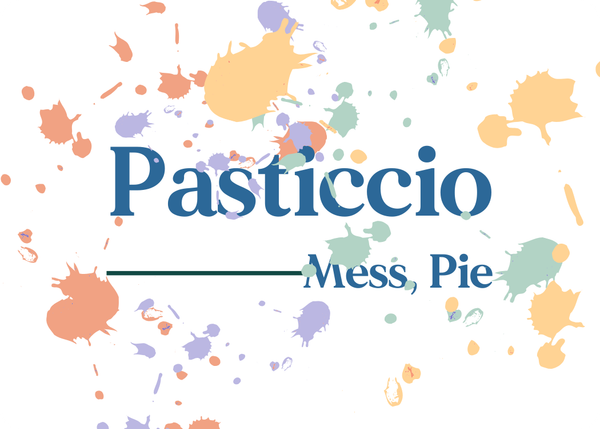Pasticcio
NOUN [masculine]
Meaning and English translation 🔖
1. Savory pie, baked dish
🇬🇧 A dish consisting of a pastry shell filled with various ingredients and baked in the oven.
🇮🇹 Pietanza costituita da un involucro di pasta ripieno di vari ingredienti e cotta al forno.
2. Mess, muddle
🇬🇧 A confused, tangled situation that's difficult to resolve.
🇮🇹 Situazione confusa, ingarbugliata, di difficile soluzione.
| Masculine ♂️ | Feminine ♀️ | |
|---|---|---|
| Singular | il - un pasticcio | - |
| Plural | i - dei pasticci | - |
Example sentences 💬
Il pasticcio di maccheroni della nonna è il mio piatto preferito.
Grandma's macaroni pie is my favorite dish.
Ho fatto un pasticcio al lavoro e ora il capo è arrabbiato.
I made a mess at work and now the boss is angry.
Questo progetto è un pasticcio: non si capisce niente!
This project is a mess: it's impossible to understand!
This article is brought to you by Giulia School, where you can learn Italian the natural way—with real conversations and passionate teachers guiding you every step of the journey. It’s the closest thing to immersion you can get without living in Italy. Click here to learn more.
Idioms with pasticcio 🇮🇹
Essere/Trovarsi nei pasticci
→ To be in trouble
Mi trovo nei pasticci: ho perso il portafoglio con tutti i documenti.
I'm in trouble: I lost my wallet with all my documents.
Combinare un pasticcio
→ To make a mess of things
Hai combinato un bel pasticcio: ho detto una bugia e non so come uscirne!
You've really made a mess of things: I told a lie and I don't know how to get out of it!
Mettersi nei pasticci
→ To get oneself into trouble
Si mette sempre nei pasticci per colpa della sua impulsività.
He always gets himself into trouble because of his impulsiveness.
Uscire dai pasticci
→ To get out of trouble
Ce l'ho fatta ad uscire dai pasticci grazie all'aiuto dei miei amici.
I managed to get out of trouble thanks to my friends' help.
Pasticcione/a
→ Messy person, butterfingers
Mio fratello è un pasticcione: non sa cucinare senza sporcare tutta la cucina.
My brother is a messy cook: he can't cook without making the whole kitchen dirty.
Where does the word pasticcio come from? 🔎
Pasticcio comes from the Vulgar Latin *pastīcium, derived from "pasta". The semantic evolution of this word is fascinating:
Initially, it only referred to a complex culinary preparation that required different ingredients mixed together and enclosed in a pastry shell.
The main characteristic of a pasticcio in cooking is precisely the mixture of different ingredients that, once cooked together, create a difficult-to-distinguish whole.
From there, by analogy, the term began to be used figuratively to indicate confused or problematic situations in which different elements are so intertwined that they are difficult to untangle—just like the ingredients in a culinary pasticcio!





